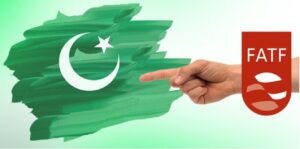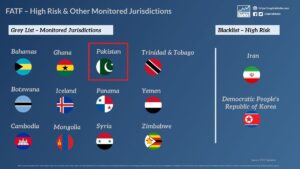by Azimul Haque 15 August 2021
Financial Action Task Force (FATF) has decided to keep Pakistan on its grey list in their June 2021 session. Pakistan has been dealing with this problem for a long period of time. The country has apparently been doing a lot to overcome this. Let us have a discussion on FATF, Pakistan’s inclusion in the FATF grey list and what Pakistan should do to resolve it.
Financial Action Task Force (FATF)
The Financial Action Task Force (FATF) was established in 1979 through the initiative of the G7 to formulate policies aimed at combating money laundering. It is an intergovernmental organization. In the aftermath of the 9/11 attacks in 2001, the issue of “Terrorism Financing” was expanded to include its mandate. By 2021, the FATF has 37 member countries; Indonesia is an observer country and several regional and international organizations are its associate member, most notably the United Nations.
The purpose of the FATF is to set the standards for implementing legal and effective measures to address money laundering, terrorist financing and other threats to the transparency of the international financial system. The FATF is a policy-making body that works to generate the political will needed to reform a country’s national economical arena. FATF monitors the progress of implementation of its recommendations through peer reviews of member countries. Since 2000, the FATF has been reviewing the economic parameters of all the countries in the world and has been operating by including some countries in the FATF Black List and FATF Grey List. Although there are only 37 member countries, the reason behind its massive importance is, if a country is included in the FATF grey or black list, the UN advises other major economies to impose economic sanctions on that country.
If FATF finds evidence of money laundering or terror financing inside the border of any country, it places the country on its grey list and directs it to act on 40 recommendations. If the country can properly comply with these 40 recommendations, its name will be removed from the grey list (or it can be said to be white-listed as well). If the recommendations are not fulfilled within the stipulated time, the specific country will be blacklisted by the FATF. At the moment, North Korea and Iran are on the FATF blacklist.
Why is Pakistan on the FATF grey list?
Pakistan has been on the grey list twice so far in 2012 and 2018. One of the reasons for being included in the gray list in 2012 was the discovery of the existence of the internationally banned militant Osama Bin Laden by the US government in 2011 in Abbottabad, Pakistan. The incident calls into question the activities of Pakistan’s security and intelligence agencies. At the same time, the credibility of the Pakistan Government in front of the international community fell under threat. Another reason is that Pakistan has taken a stand against two UN Security Council Resolutions in 2012 and refrained from signing them. The resolutions were 1267 and 1373, stating that no country would in any way support any militant group within its borders, consent to conduct its activities and confiscate all their property. The UN had suggested that the country be included in the grey list if it failed to comply with these two resolutions. The history of that time shows that militant groups like Tehreek-e-Taliban, Lashkar-e-Taiba, Jama’at-ud-Da’wah, etc. were conducting open activities inside Pakistan. For these reasons, Pakistan, which is included in the grey list, has been working on 40 recommendations for the next 3 years. In some cases, progress has actually been made. In 2013, Pakistan amended their Anti-terrorism Act. In 2014, Pakistan implemented the National Internal Security Policy for the first time in their history. For these reasons, in February 2015, the FATF removed Pakistan from the grey list.
In 2016, a ruling in the Lahore High Court said that, Hafez Saeed, the head of Jama’at-ud-Da’wah, would be released and his property would be returned to him because international organizations could not provide sufficient evidence against him. As a result of this incident, in 2018, the FATF again included Pakistan in the grey list. Subsequently, the FATF initially asked Pakistan to act on 27 recommendations. According to Pakistani media, Pakistan has fully complied with 26 recommendations. The FATF added six more points and asked Pakistan to work on them as well.
What Pakistan should do
So far, Pakistan has been working diligently on the 27 points and six additional points recommended by the FATF. One thing is clear here, America and India have direct and indirect role behind this. The US wants a military base inside Pakistan on the Afghanistan issue. On the other hand, the Prime Minister of Pakistan Imran Khan has made it clear that this is ‘Absolutely Not’ possible. In response, in June this year, the US government influenced the FATF to keep Pakistan on the grey list.
On the other hand, the Indian media has always accused Pakistan of being behind the operations of militant groups like Jama’at-ud-Da’wah, Falah-e-Insaniat, Jaish-e-Mohammed and others in India. India will always want Pakistan to be on the FATF grey list as a weapon to put pressure on Pakistan to maintain its subcontinental power.
Considering these aspects, what Pakistan can do is –
First of all, the initiatives taken so far can be clearly presented to the media as taken against the 27 + 6 points recommended by the FATF. For example, in 2020, the government of Pakistan amended the Anti-Money Laundering Act, the Anti-Terrorism Act and the United Nations Security Council Act which are capable of meeting all the requirements of the FATF.
Secondly, the Pakistan National Counter Terrorism Authority, the Pakistan Security Exchange Commission, the Federal Bureau of Revenue and the State Bank of Pakistan and other finance related organizations can highlight major developments in their regular reports.
Thirdly, the government can instruct all finance agencies to work transparently, as well as to issue citizen charters and ensure the right to information to ensure the positive image of the concerned agencies.
Fourthly, by signing Memorandums of Understanding (MoU) with the countries where money laundering is being alleged against the country, Pakistan may investigate the issue of money laundering and take necessary disciplinary action against those involved.
Fifthly, Pakistan can completely move away from the Geo-Strategic Foreign Policy, establish and effectively execute the Geo-Economic Foreign Policy (in which they are already working on) to strengthen its economic ties with different countries and restore its positive international image. The countries of the Muslim world, Turkey, Malaysia, China (CPEC) will be on Pakistan’s first consideration list in this regard.
In order to survive economically and get off the FATF grey list, Pakistan must adopt a strong foreign policy while focusing on the technicalities of the domestic economy.


